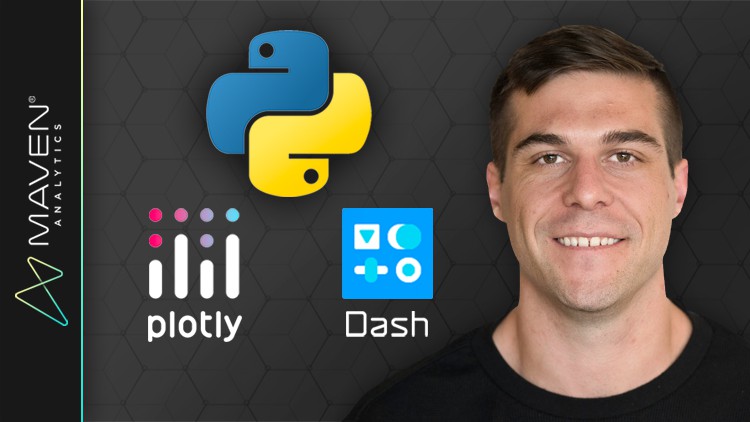
Description
This is a hands-on, project-based course designed to help you master Plotly and Dash, two of Python’s most popular packages for creating interactive visuals, dashboards and web applications.
We’ll start by introducing the core components of a Dash application, review basic front-end and back-end elements, and demonstrate how to tie everything together to create a simple, interactive web app.
From there we’ll explore a variety of Plotly visuals including line charts, scatterplots, histograms and maps. We’ll apply basic formatting options like layouts and axis labels, add context to our visuals using annotations and reference lines, then bring our data to life with interactive elements like dropdown menus, checklists, sliders, date pickers, and more.
Last but not least we’ll use Dash to build and customize a web-based dashboard, using tools like markdown, HTML components & styles, themes, grids, tabs, and more. We’ll also introduce some advanced topics like data tables, conditional and chained callbacks, cross-filters, and app deployment options.
Throughout the course you’ll play the role of a Data Analyst for Maveluxe Travel, a high-end agency that helps customers find flights and resorts based on their travel preferences. Your task? Use Python to create interactive visuals and dashboards to help Maveluxe’s travel agents best support their customers.
COURSE OUTLINE:
- Intro to Plotly & Dash
- Introduce the Plotly & Dash libraries, and cover the key steps and components for creating a basic Dash application with interactive Plotly visuals
- Plotly Figures & Chart Types
- Dive into the Plotly library and use it to build and customize several chart types, including line charts, bar charts, pie charts, scatterplots, maps and histograms
- Interactive Elements
- Get comfortable embedding Dash’s interactive elements into your application, and using them to manipulate Plotly Visualizations
- MID-COURSE PROJECT
- Build two working Dash applications to help the Maveluxe team visualize and explore data from ski resorts across the US and Canada
- Dashboard Layouts
- Learn how to organize your visualizations and interactive components into a visually appealing and logical structure
- Advanced Functionality
- Take your applications to the next level by learning how to update your application with real-time data, develop chained-callback functions, and more!
- FINAL PROJECT
- Build a multi-tab dashboard to expand your mid-course project to ski resorts around the world, leveraging grid layouts, interactive elements and visuals, and advanced callback functions
Join today and get immediate, lifetime access to the following:
- 8.5 hours of high-quality video
- Plotly & Dash PDF ebook (180+ pages)
- Downloadable project files & solutions
- Expert support and Q&A forum
- 30-day Udemy satisfaction guarantee
If you’re a data scientist, analyst or business intelligence professional looking to add Plotly & Dash to your Python skill set, this is the course for you!
Happy learning!
-Chris Bruehl (Python Expert & Lead Python Instructor, Maven Analytics)
Who this course is for:
- Analysts or Data Scientists who want to build interactive visuals, dashboards or web apps
- Aspiring data scientists who want to build or strengthen their Python data visualization skills
- Anyone interested in learning one of the most popular open source programming languages in the world
- Students looking to learn powerful, practical skills with unique, hands-on projects and course demos
Requirements
- We’ll use Anaconda & Jupyter Notebooks (a free, user-friendly coding environment)
- Familiarity with base Python and the Pandas library are strongly recommended, but not a strict prerequisite
Last Updated 2/2023
Download Links
Direct Download
Python Data Visualization: Dashboards with Plotly & Dash.zip (3.3 GB) | Mirror


